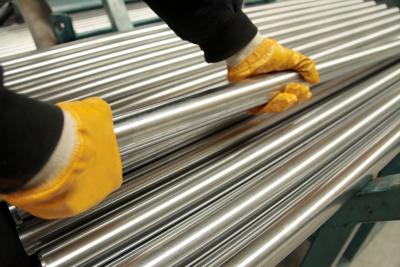
Titanium is known for its excellent strength-to-weight ratio and corrosion resistance. In nature, titanium is an abundant metal, ranking the ninth most plentiful in the earth’s crust. Titanium and its alloys possess tensile strengths from 30,000 psi to 200,000 psi (210-1380 MPa), which are equivalent to those strengths found in most alloy steels. Titanium has a high melting point of 3135°F (1725°C), which is approximately 400°F (220°C) above the melting point of steel and approximately 2000°F (1100°C) above that of aluminum. It also has the advantage of having a very thin, conductive oxide surface film and a hard, smooth surface that limits adhesions of foreign materials.
United Performance Metals carries commercially pure titanium (CP-Ti) and titanium alloys. Commercially pure titanium’s strength increases with the grade number. The higher the number, the higher the metal’s strength endurance. Grade 1 has the highest corrosion resistance, formability, and lowest strength, while Grade 4 offers highest strength and moderate formability. Titanium alloys are created by mixing titanium with other metals to provide additional strength, flexibility, and malleability. The main differences between commercially pure and titanium alloys include:
Strength: Titanium alloys demonstrate a high strength and fatigue resistance.
Density: Titanium alloys are denser due to the alloying elements.
Corrosion: Commercially pure titanium has better corrosion resistance than titanium alloys.
Grade 2 has higher levels of iron and oxygen than other CP grades, which offers excellent formability and moderate strength with superior corrosion resistance. CP Grade 2 is widely used in heat exchangers. Grade 2 titanium is one of the most common titanium grades, with properties that make it a good candidate for chemical and marine, aerospace and medical applications.
Best for: Environments with high corrosion.
Advantages: Highly resistant to corrosion in oxidizing environments, excellent cold forming, lightweight, biocompatible, and versatile.
Applications: Airframe skins, ductwork, brackets, galley equipment, medical devices, condensers, evaporators, desalinization tubing.
Limitations: Susceptible to hydrogen embrittlement and low strength compared to higher commercially pure titanium.
Grade 3 is a general-purpose grade of commercially pure titanium that has excellent corrosion resistance in highly oxidizing to mildly reducing environments, including chlorides, and an excellent strength-to-weight ratio. It has good impact properties at low temperatures. It can be welded, machined, cold worked, hot worked, and cast.
Best for: Applications that require high strength and excellent corrosion resistance.
Advantages: Higher tolerable level of oxygen than CP Grade 2 and a higher minimum strength requirement. It can be used for parts that need strength up to 400° F and oxidation resistance up to 600° F.
Applications: Airframe skin, airframe parts, medical screws and plates, cooling system components.
Limitations: Limited wear resistance and less formable.
Grade 4 is the strongest of the CP grades, with a minimum yield strength of 480 MPa (70ksi), and has the highest allowable oxygen and iron content of the grades. Grade 4 titanium features excellent resistance to corrosion and corrosion fatigue as well as high strength.
Best for: High strength and high corrosion resistance.
Advantages: Strongest commercially pure titanium grade, excellent corrosion resistance and fatigue, not subject to grain boundary embrittlement at elevated temperatures.
Applications: Aircraft skin, jet engine components, aerospace fasteners, desalinization plants, corrosive waste disposal wells, and paper production.
Limitations: Least moldable, low ductility, and has a low yield strength.
Ti-6AL-4V is one of the most popular alloys in the titanium industry and accounts for almost half of the titanium used in the world today. Commonly referred to as Ti-6AL-4V (or Ti 6-4), this designation refers to its chemical composition of almost 90% titanium, 6% aluminum, 4% vanadium, 0.25% (max) iron and 0.2% (max) oxygen. It features excellent strength, low modulus of elasticity, high corrosion resistance, good weldability and it is heat treatable. The addition of aluminum and vanadium increases the hardness of the material in the alloy matrix, improving its physical and mechanical properties.
Best for: Applications where high strength, low weight, and corrosion resistance are needed.
Advantages: High strength-to-weight ratio, resists corrosion in many environments, can withstand extreme temperatures, readily formed and machined.
Applications: Jet engine blades, discs, and rings, airframe components, pressure vessels, medical implants, Base plates, fasteners.
Limitations: Low surface hardness, poor thermal conductivity, brittle at low temperatures, susceptible to stress corrosion cracking (SCC).
Ti-6AL-4V ELI has the ELI (extra low interstitials) variant which possesses high cycle fatigue strength and is available for fracture-critical applications, such as medical implants or aerospace applications. Titanium Grade 23 material is biocompatible, features moderately high tensile strength, improved ductility, good fatigue strength, intermediate fracture toughness, and high resistance to general corrosion in seawater.
Best for: Less oxygen helps improve the material ductility, toughness, and biocompatibility.
Advantages: Corrosion resistance, biocompatibility, high strength and low weight.
Applications: Medical implants, airframe and engine rocket components, pressure vessels, fasteners.
Limitations: poor thermal conductivity, brittle at low temperatures, susceptible to stress corrosion cracking (SCC).
Ti-6242 is a near-alpha titanium alloy that offers excellent strength, stability and creep resistance. This alloy is suitable for long-term high temperatures, making it a perfect fit for aerospace and engine components.
Best for: High temperature environments where excellent mechanical and tensile strength is needed.
Advantages: Temperature, corrosion, and creep resistance, strength, low density.
Applications: Airframe structures, engine parts, jet engine compressors, impellers and turbines.
Limitations: Complex manufacturing process, narrow range for hot working conditions, difficult machining.
Posted November 19, 2024
Return to Blog
